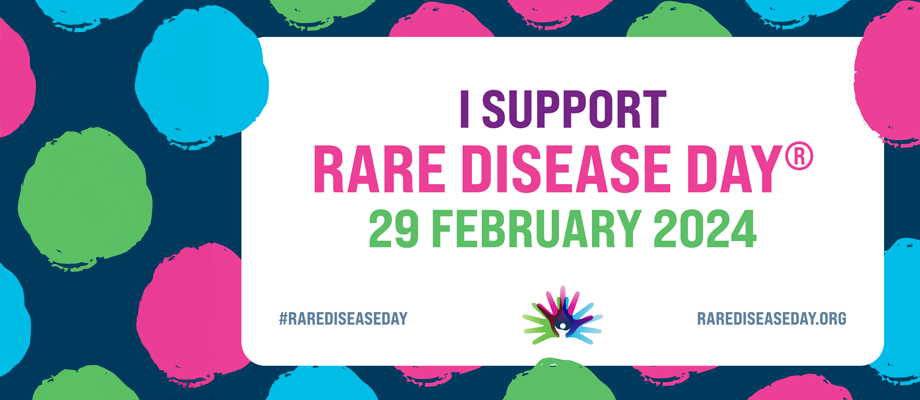
Rare Disease Day: researchers at Nottingham are committed to making a difference
February 28th, 2024
Dr Rebecca Trueman and colleagues introduce a network of researchers and clinicians who are committed to improving the lives of the 3.5 million people in the UK who live with a rare condition.
Tomorrow is Rare Disease Day, chosen as 29 February (or 28 February in non-leap years) is the rarest day of the year.
Yet rare diseases are not so rare and affect many more of us than you may think. A rare condition is defined as a condition that affects fewer than 1 in 2,000 people. However, there are around 7,000 rare conditions, with more being identified as science progresses, and 1 in 17 people are affected by a rare condition at some point in their lives.
Rare Disease Day aims to raise awareness of the 3.5 million people in the UK and 300 million worldwide who live with a rare condition, and what we can do to better understand the challenges they face and to improve their lives.
80% percent of rare diseases are genetic, 70% start in childhood, and one out of five cancers are classed as rare. Common challenges associated with rare diseases include significant delays to diagnosis, with more than a third of people having to wait more than five years to get a diagnosis, and only one out of 20 rare diseases have an approved treatment option. More than three out of 10 children with a rare condition die before their fifth birthday.
Here at the University of Nottingham, we are working together on these challenges, to improve the lives of those living with rare diseases. Our new Rare Disease Research Network is bringing together more than 50 academics across schools and faculties, with interests ranging from fundamental research into the biological mechanisms of rare diseases to clinical trials for new treatments.
Combining our expertise into a multidisciplinary network of researchers is allowing us to exploit our strengths, share best practices, and accelerate research to enhance the lives of those living with rare diseases.
We have strong connections with the Queen’s Medical Centre and City Hospital, which host a number of rare disease clinics. Two highly specialised services commissioned by the NHS include the only UK clinics for Lymphagioleiomyomatosis (LAM) and paediatric Ataxia-Telangiectasia (AT). LAM is a rare lung disease that affects mostly women of childbearing age.
Abnormal muscle-like cells begin to grow out of control within the lungs, leading to difficulty breathing, while AT is a very rare, complex multi-system disorder, affecting an estimated 200 people in the UK, that requires a specialist multidisciplinary team.
All paediatric cancers are rare diseases, and the Children’s Brain Tumour Research Centre, set up in Nottingham in 1997, brings together a multidisciplinary team of healthcare professionals and researchers to improve the understanding, treatment and outcomes of children and young adults who develop brain tumours.
In addition, secondary and tertiary care hospital clinics in Nottingham care for and treat hundreds of people with other rare diseases. The National Institute of Health Research (NIHR) Nottingham Biomedical Research Centre, which works on a wide range of rare diseases including Lymphangioleiomyomatosis, cystic fibrosis, Ataxia Telangiectasia, brain tumours, myotonic dystrophy and rare autoimmune rheumatic diseases (RAIRD), further demonstrates Nottingham’s commitment to rare disease research.
The Rare Disease Research Network’s first area of focus will be the use of health data in rare disease research, exploring the Biomedical Research Centre’s leadership in harnessing health informatics and big data to benefit patients.
By bringing researchers across disciplines, and strengthening links and sharing knowledge with clinicians and NHS colleagues at our local hospitals, we hope to further establish Nottingham as a hub for innovation, where our work can make a real difference to the lives of patients living with rare conditions.
Find out more
If you are interested in joining the university’s Rare Disease Research Network, please email Rebecca Trueman
Rare Disease Day is a global alliance pushing for lasting change that improves the lives of everyone affected by a rare condition, with the UK initiative lead by Rare Disease UK, Medics4RareDiseases offers resources for medical professionals about rare disease.
For more on the Nottingham BRC, follow @NottmBRC.
Dr Rebecca Trueman, Associate Professor of Neuroscience in the School of Life Sciences, based at University of Nottingham Medical School
Dr Suzanne Miller, Senior Clinical Studies and Project Manager, NIHR Biomedical Research Centre
Dr Andrew Prayle, Clinical Associate Professor Academic Child Health, Lifespan and Population Health, School of Medicine, University of Nottingham
Dr Fiona Pearce, NIHR Advanced Fellow & Clinical Associate Professor, University of Nottingham Unit of Lifespan and Population Health, School of Medicine
Tags: Biomedical research, health informatics, Rare Disease Day, Rare Disease Day 2024, research, University of Nottingham Children's Brain Tumour Research Centre
Leave a Reply
Other

Need news? See you on SharePoint
After 14 years of service, Campus News is being retired as the university’s staff news platform. […]

Roads and car parks closed for refurbishing work
As part of ongoing road improvements at the university, works will be taking place to resurface […]

